COVID-19: Women most affected, says UN Women
UN Women says the outbreak of Covid-19 could impact women more than any other demographics and has urged governments rolling out income protection to focus on women. “Where governments or businesses put income protection in place, this can ease these dilemmas, sustain incomes and avoid driving households into poverty,” said Phumzile Mlambo-Ngcuka, UN Women executive […]

UN Women says the outbreak of Covid-19 could impact women more than any other demographics and has urged governments rolling out income protection to focus on women.
“Where governments or businesses put income protection in place, this can ease these dilemmas, sustain incomes and avoid driving households into poverty,” said Phumzile Mlambo-Ngcuka, UN Women executive director.
“This response must also include those in the informal economy, where most women who work outside home make their livelihood. Such social protection is best directed specifically to women.”
It comes as governments increasingly order school closures that mean children have to stay home—and mothers become both educators and caregivers.
And professional women face a dilemma of needing to return to work but are having to forgo that enable their higher-earning partners continue work.
“As schools close in more countries, the number of mothers facing this across the world rises and the consequences accumulate,” Mlambo-Ngcuka said.
A total 284,566 people have been infected by Saturday, and 11,868 people killed.
“Without data that is disaggregated by sex, however, these numbers give us only part of the story of the impact on women and men,” UN Women said.
“We need far more sex-disaggregated data to tell us how the situation is evolving, including on differing rates of infection, differential economic impacts, differential care burden, and incidence of domestic violence and sexual abuse.
Previous outbreaks have shown the vulnerability of women—from the 2014-16 Ebola outbreak in the West African countries of Guinea, Liberia, and Sierra Leone to the 2015-2016 Zika epidemic in Latin America.
“Women in those outbreaks were exposed to both health and economic risks, as they are again now, in ways intrinsically connected with their roles in the community and responsibilities as caregivers within the home and family.
“For example, both Ebola and Zika infections are potentially catastrophic for pregnant women. Yet during both previous outbreaks, access to family planning services were very limited, and pregnant and lactating women were excluded from vaccination against the viruses.
“This underlines the importance of sustained maternal health services to avoid a resurgence of birth-related deaths, and equal access for women to the development and use of all medical products including vaccines once produced.
“This is a time of reckoning for our national and personal values and a recognition of the strength of solidarity for public services and society as a whole. This is an opportunity to build back better, stronger, resilient and equal societies. It is a time for bold prioritization. Taking the right steps now with an eye to a restored future could bring both relief and hope to the women of the world.”
